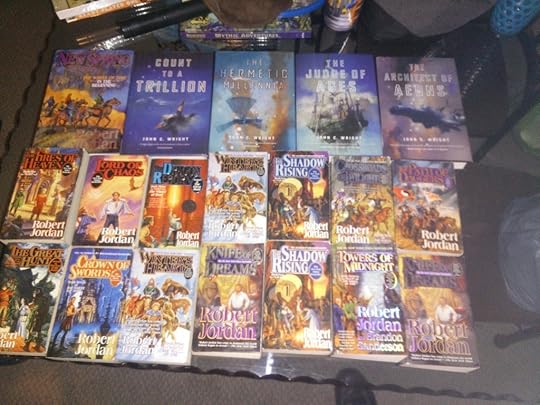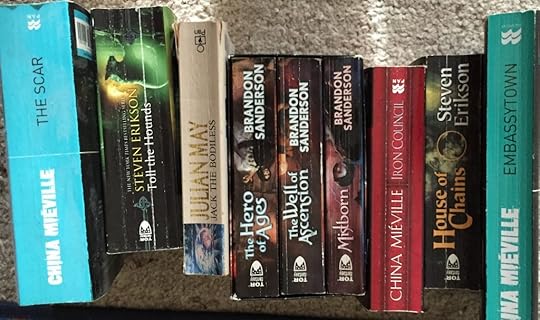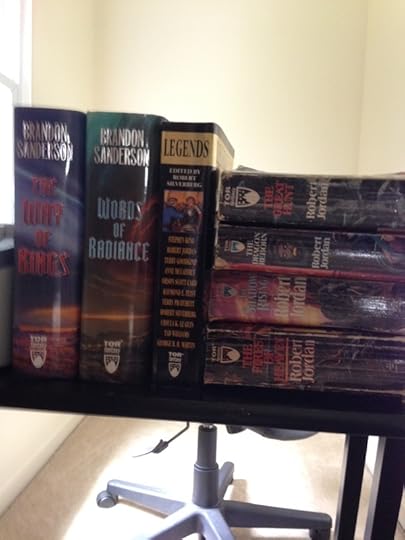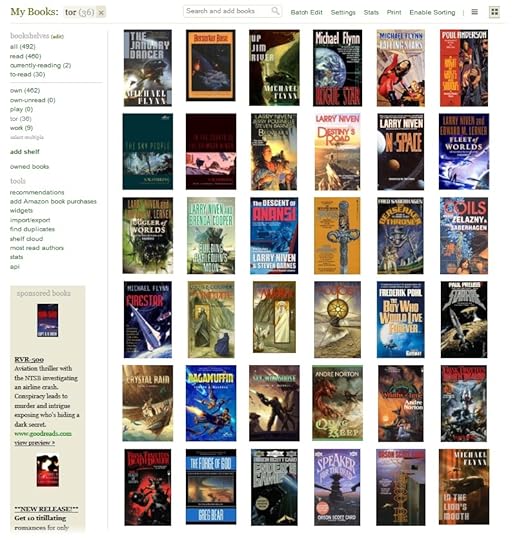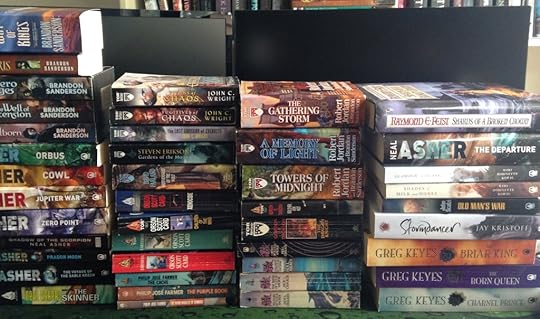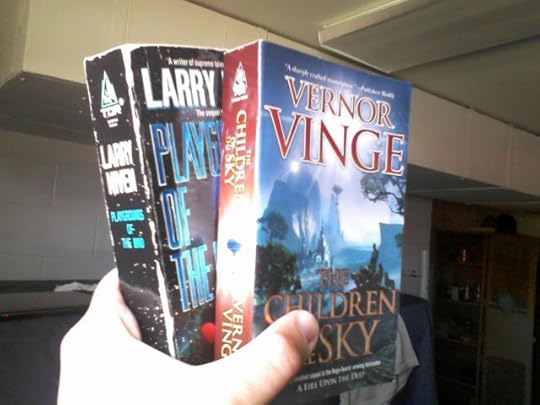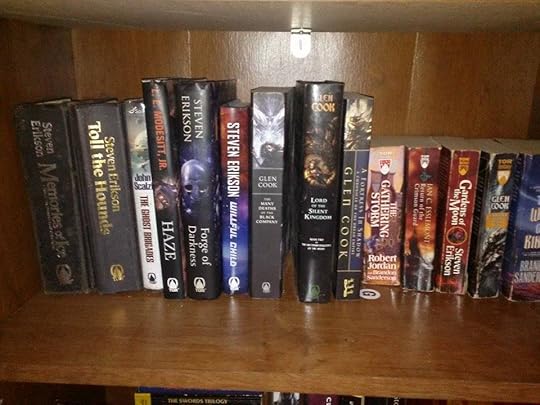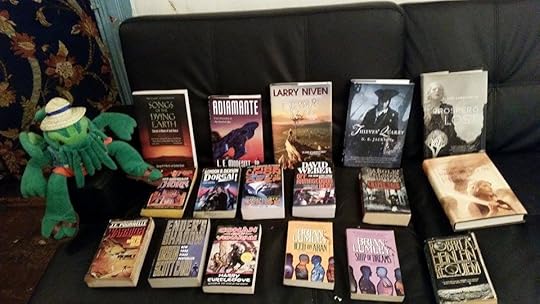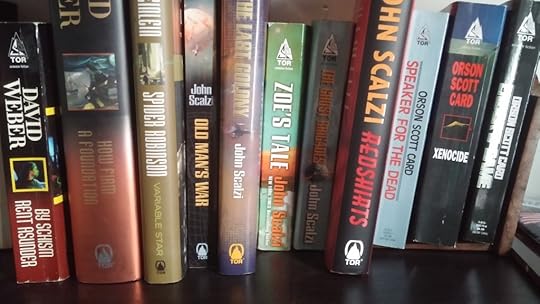L. Jagi Lamplighter's Blog, page 20
July 18, 2015
War of the Worlds Two! We invade Mars!
New story by Steven G. Johnson:
INVADERS FROM EARTH,
sequel to
WAR OF THE WORLDS
In the final years of the Nineteenth Century, the pitiless intellects of Mars were moved by desperation to attack our own warm world in the hopes of adding it to their domain. For the inhabitants of the Earth, they had few firm intentions; we would supply their conquest in its early stages, then pass from the scene. Their eyes were on our water, and the heat of our mutual Sun.
The story of how the invaders came to grief is well known. The equatorial regions were too hot, their plant and microbial life too variegated, for the Martian physiognomy to cope with. Cooler regions in Europe and East Asia were held by great numbers of organized humans, who fought with relatively primitive weapons against plasma bloom and corrosive vapor. Only the vast empty lands rimming the Arctic Circle, in Siberia and Canada, offered a foothold to the invaders, and those only a temporary respite as the aroused fury of the Americans, Europeans and, to everyone’s surprise, Japanese mounted colossal armies to reduce the Martian strongholds with the furious implacability of advancing ice.
From equipment, the partial diagrams used by the Martians’ mechanical servants, and the instructions they issued their human captives, we determined the means by which they had come here. We could not duplicate it in reverse, to visit a hundredfold on their homes what they had done to ours. For the gravitation in effect on Mars’ surface is barely more than a third of what we daily endure; and by the cold equations of ballistics, a voyage in the other direction must necessarily begin with an acceleration not merely three times as great, but nine, being the square of three. No human frame, however cushioned, could survive such a shock as that.
So we built, and studied, and explored alternatives. Our population we estimated at tens of thousands that of ancient, withering Mars, albeit the mechanical energy they could bring to their tasks was at least our equal. All Earthmen united in the common goal; so long as Mars was free to strike us, they might do so at any moment, until the sword was struck from their hand by main force.
So we schemed, and probed the secrets of nature, and armed for their return, and our eventual own. And as by the process of criticizing every stratagem, airing and debating every doubt, we winnowed out the best of all alternative courses, and slowly and surely drew our plans against them.
As with any artillery, the entire impetus of the vessel carrying astronauts across the deeps had to be transmitted in the very first moment of the voyage. Our enemies had used some form of flameless propulsion to hurl themselves from their planet’s edge. We were restricted to the fuels and explosives which chemistry allowed. A projectile sturdy enough to survive the shock of launching could, it appeared, just be devised given the utmost refinement in metallurgy and assembly; but it could not carry any one or anything, being of its required nature completely solid.
Although the projectile thus fired would pass between our worlds for several months at a sedate speed (so-called only by comparison with the immense distances involved), as it neared the target world, Mars’ own gravitation would go to work, speeding the projectile faster and faster until, at its eventual impact, its velocity would be equal to that of those minuscule stones which form the shooting stars of which astronomers are fond. But shooting stars become visible as friction with our Earth’s air heats and boils them; Mars has barely any of that same armour against missiles from above. The collision between our projectile and the Martian surface would resemble the detonation of a trainload of high explosive, all concentrated in one place. Some savants opined it would be closer to a shipload than a trainload.
Compared to the area of a world, such destruction would be nugatory indeed. Which is why every telescope was trained on Mars, for every nighttime instant she was visible above the horizon. And by the time the flashes of light against the rugose plains announced our enemy’s intention to try again, those selfsame flashes, measured and cross-checked, told us where to aim the greatly-multiplying siege engines across the equatorial territories, and so the rain of retaliation from the Earth commenced.
Various means of eluding the cold equations of ballistics were proposed, and some were tested, with dreadful results in a few cases. What the British Empire deemed too risky, the French, or the Americans, might try, and what even those venturesome republics thought too far from the pale of reason, the Russian Czar or the German Kaiser might well dare. The Empire of Japan agreed to build and develop what Europe had devised, as did Italy, Austro-Hungary, and other minor scientific states. For it was science, not sheer numbers, military might, wealth in specie or credit, nor even the high level of civilization a nation possessed, which made them useful to the great crusade.
It was the Austro-Hungarians, with their tradition of small, sidewise steps toward great goals, who hit upon the only practical way to convey our avengers across the gap. The bulk of the shock on our voyagers would be incurred in hurling them loose from the surface of our planet, into the upper atmosphere. From there, they would assume an orbit like that of our Moon, eternally falling yet remaining aloft. And from that apparently self-contradictory condition, it remained only to impart a velocity sufficient to traverse the gap between worlds in a short enough time that provisions might hold out, yet not so swift that their impact at the far end should render all aboard unable to fulfill their tasks.
What these tasks were to be, come the day, had yet to be decided. But there was ample time for lively debate, while in British India, French Africa, South America and the German Pacific, the mortars to hurl our astronauts into orbit were constructed, and the anchorage in the sky from which the invasion fleets were to sally was nightly taking shape above our heads, visible to the merest glass or set of hand-held lenses.
Nor was there but one synthetic star in the heavens which we and the Martians contested. For no agreement was reached over the proper design of the anchorage, with seven separate efforts mounted in parallel by various nations. That of France was quickly abandoned by her fickle administration, which had an even better idea at an average of every six months. One effort begun by the United States was let languish, then sold to the British Empire, as the Americans pursued another idea with redoubled vigor.
This was to base construction of the invasion fleet, not in orbit above the Earth, but upon the Moon, whose feeble gravitation would scarcely impede the long journey's start but whose ready supply of minerals might save much labour and effort. For every pound which went into the invasion vessels' construction must needs be lifted from the Earth, at great cost in propellant, but also of time, for only a finite number of such launches could be cast aloft each day. On the Moon, so the argument ran, metal and stone were free for the taking, and if there be ice under the lunar surface, water and air would be much easier to extract than to haul labouriously aloft.
On the mathematical surface, the Lunar initiative had everything to recommend it. Leave alone that no reliable method for smelting metal from ore in the absence of an atmosphere had yet been devised; we would devise one here, under the surface of our lakes and oceans. Set aside the imponderables of working with heavy machinery while garbed in an air-tight garment; we would adapt the clothing of deep-sea divers, and test them in chambers emptied of air for the purpose in our many universities. And let alone all clamour over the prodigious amount of heat required, for fuel, to burn, must have air, and plentiful air at that. These problems had existed in the internal-combustion engine, which was on its way to being perfected, and would yield to painstaking measurement, careful computation, and hard-headed practicality.
In short, the very characteristics in which the Martians excelled all mankind.
We should not have been surprised, then, when the thinking of the great brains of Mars paralleled our own. When their second invasion failed more swiftly than the first, they reckoned the great disparity of their means to ours, and resolved to redress the balance by removing their base of operations much closer to their target. They, too, would extract their essential minerals from the soil of a dead world, but not from their own, but one even further along the path to senescence than the red mausoleum from which they proposed to flee. They, too, would husband their resources on a nearby astronomical island, before rushing the final gap with at least locally overwhelming force. And they, too, would strain every effort, as before they had only imagined themselves to have done, to secure victory over the only portion of the celestial universe on which life as we both defined it could comfortably endure.
They, too, would require the Moon for their purpose. Who controlled the Moon, would control the Earth.
July 15, 2015
Newest Cover Unveiled!
John C. Wright on Brainstorm!
Want to hear John talk? Curious what an Evil Legion of Evil Author sounds like?
Register for Brainstorm with John C. Wright on Jul 16, 2015 from 7:00 PM to 8:30 PM EDT at:
https://attendee.gotowebinar.com/register/5586859741601403906
This is an Open Brainstorm session with 5x Hugo nominee John C. Wright
After registering, you will receive a confirmation email containing information about joining the Webinar.
The event can host to 500 people; there are already 60 people registered.
July 13, 2015
An interesting article on how to generate story ideas
Thought this was a rather interesting subject:
7 Ways to To Turn Sci-Fi Ideas Into Stories
by Emerson Fortier
Science fiction writers are constantly dreaming up new ideas, but not always ideas for great new stories. More often its some gadget or tool, or engine, or spacecraft design that pops into our heads one day and says “Gee, wouldn’t it be nice to see me in a story?” and of course it would. But a gadget or some new scientific discovery is not a story, and much as we wish we could just write a dissertation on our reat new idea, no one is going to be buying it without a story. So how do we build a story around great science fiction ideas? Here are seven types of sci-fi innovations and the way a story can be built around them.
June 24, 2015
Adorable Rachel Griffin!
June 21, 2015
I Am Not A Robot! I Am A Hundred Free Fans!
As of the first photo below, we have reached 100! (This is counting people, not photos or lists, as a few folks sent multiples.)
Page One: The first 56. Page Two: 57 to 99.
Kathy in Texas asks that the following be posted with her photo:
"A sampling of Tor titles (with some St. Martin's Press mysteries thrown in for seasoning), assembled by unpacking a few random boxes. In other words, this is what a search for Tor books in my collection yields when I'm not even really trying. Those in favor of the status quo will attempt to disqualify part of this collection, saying that those old Poul Anderson, William Sanders, and Rebecca Ore books shouldn't count; that Tor hasn't published that stuff in decades. To which I say: congratulations for recognizing a piece of the puzzle when it's handed to you. Let's see if you can draw any conclusions."
Arlan from … writes: Upside down = distress signal.
June 17, 2015
I Am Not A Robot! I Am A Free Fan, Too!
Continuing the photos of Tor Books found on Page One.
Again–giving Tor readers a chance to demonstrate that they are real people…and that they are, in fact, Tor readers.
Carl from Boston, MA:
Trent from Seattle, WA:
Extreme-radical-extra-chromosome-baby-seal-clubbing-throw-grandma-off-the-cliff-after-feeding-her-dog-food-bible-totin-gun-clinging-vast-right-wing-conspiring-against-BossieTheMAO-fly-over-country-racist-bigot-homophobe-half-breed-VoxDaySympathizing-neoNazi (although I still don't see how they can lump right wing with National Socialism) in North Carolina
Emilio from Chihuahua, Mexico:
Denver from Germany (who says these are just a few of his collection):
Benjamin Wheeler of Saint Louis, Missouri:
Chris from Florida:

Po from Connecticut (who also lost a dozen or so Tor books in a spring flood.):
Paul from Virginia:
Dave from North Dakota (5 of his over 50 Tor purchases.):
Mark Ping from Chico, California:

Richard from Costa Mesa, CA:
Josh from USA:
Ken from California:
Darth Toolpodicus from Pittsburgh, PA:
Eric from Manhattan:
Josh from Washington:
Carole from Los Angeles, CA (just part of her Tor purchases.):
Mark from Georgia:
Samuel from Melbourne, Australia reports that he also has ebooks:
George from Indy



Joe from North Dakota:

Mark from Houston, TX:

David from Boulder County, CO (who reports, like many others, that this is not all):

Kerani — Not a nazi, not a political extremist, not a bot (Just a few of her books):
Stanley Miller from Gilbert Arizona–his Tor books are among these, plus many on Kindle:

Jeremy from Wisconsin:

Meredith from West Virginia:
nthony, Piers. Race Against Time.
Anderson, Poul, ed. Berserker Base.
Anderson, Poul. Hoka!
Anderson, Poul. New America.
Anderson, Poul. Operation Luna.
Anderson, Poul. Time Patrolman.
Anderson, Poul. The Shield of Time.
Barnes, John. One for the Morning Glory.
Bell, Clare. People of the Sky.
Brin, David. Kiln People.
Card, Orson Scott. Ender's Game.
Seventh Son.
Speaker for the Dead.
Dean, Pamela. Dubious Hills, The.
Tam Lin.
Dickson, Gordon R. Final Encyclopedia, The
Last Master, The
Lost Dorsai
Man from Earth, The
Other.
Doctorow, Cory. Little Brother
Doyle, Debra. Price of the Stars, The
Drake, David. Bridgehead.
Cross the Stars.
Forlorn Hope, The
Kagan, Janet. Hellspark (three copies)
Mirabile.
Klaper, Steven. Agents of Insight
Kornbluth, C.M. Not This August.
Syndic. The.
Kushner, Ellen. Thomas, the Rhymer.
Laumer, Keith. The Monitors.
Norton, Andre. Flight in Yiktor.
Moonsinger's Friends (two copies)
Pournelle, Jerry. There Will Be War
Saberhagen, Fred. Seance for a Vampire.
Scott, Melissa. Burning Bright. (two copies)
Point of Hopes.
Sheffield, Charles. Billion Dollar Boy, The.
Silverberg, Robert. Time of the Great Freeze.
Stevermer, Caroline. College of Magics, A.
Sucharitkul, Somtow. Mallworld.
Turtledove, Harry. Between the Rivers.
Watt-Evans, Lawrence. Split Heirs.
Comments
June 15, 2015
I Am Not A Robot! I Am A Free Fan!
Again, I am collecting these photos not to shame Tor, but to help readers let Tor know that they are real people. I will add to this as photos come in.
Tor books owned by fans who feel that Tor has offended or betrayed them.
From Cedar in Ohio. (She also encourages people to check out her letterwriting campaign.)
I am not a Malware! (Brad from Utah)
Jared from Salt Lake City.(electronic collection.)
Jason from Warr Acres, Oklahoma (dead tree part of his collection):
Greg from Oak Ridge Tennessee:
Gary from Canton, Ohio, a life-long sci-fi & fantasy reader:
Eric from Texas:
Josh from Columbus, Ohio:
Kamas from West Fargo, ND:
Cecila from Texas:
Seamus from New York:
and:
Pat from Woodstock, Georgia:
Sara from Metro Detroit, MI. Sara reports that she is not a Puppy, but Ms. Gallo's words offended her:
Christine from Boardman, Ohio (These are her SF paperbacks. The Tor books are mixed in.)
Joseph from Houston, TX:
Chris from Alberta:
Viriginia from Virginia.
(The rumor that those whose pictures do not include my Tor books will be eaten by screaming eels is totally untrue…but if it were true, Virginia and Cthulhu here would survive!)
Mike from Indianna:
Frances from Japan:
Keith from Virginia, who says: I am NOT a robot, but a customer….:
Tor and the Puppies: I Am Not A Number!
The last week or so has been very painful.
On one hand, I have tremendous sympathy for the many good folks at Tor, some of whom I have known for 30 years.
On the other hand, I also have tremendous sympathy for the fans—a few of whom are veterans who fought actual Nazis—who feel they are tired of being heckled and humiliated by a very few Tor employees, who have been behaving in a less than professional manner.
Many of these readers are people I know, people I interact with online, or fans of John’s who have written us thoughtful letters explaining why they regretfully feel they must stop buying Tor book, despite their desire to keep reading John’s latest series.
I was thus appalled to see posts suggesting that the emails to Tor—many of which, I am led to understand, are arriving with photos of the reader’s Tor book collections, in some cases, collections worth thousands of dollars—were not legitimate but were sent from automated bots.
Tor Folks: You may disagree with the Sad/Rabid Puppies, or feel loyalty to your co-workers—but please! Don’t insult our readers by claiming they don’t exist!
Readers: I realize that, in the age of electronics,this is an unprecedented request, but: if you have a strong opinion that you wish to be heard, it might help if you committed it to physical paper—perhaps along with a printout of your photo of your Tor book collection—and snail mailed it to Tor and Macmillan.
Also, feel free to send me your photo of your Tor books. I will post any photos or links I receive on my website, so everyone can see that you are a real person with real books. (If possible, include in
For my part, I shall continue to pray that these differences can be resolved,
and we can all go back to reading good books!
June 13, 2015
Signal Boost: Nethereal by Brian Neimeier
New Space Opera with Pirates!!!
I am particularly delighted to announce this book, because I got to help edit it at an earlier stage.
You can read more here.
A woman like no other who longs for acceptance. A precision killer inspired by the dream of his captain. The last member of a murdered race, fighting to avenge his people against the overwhelming might of the Guild…and the dark powers behind it.
The Sublime Brotherhood of Steersmen holds the Middle Stratum in its iron grip. Jaren Peregrine, last of the Gen, raids across the fringe spheres beside Nakvin—a pilot whose relationship with her captain transcends the professional, apprentice steersman Deim, and laconic mercenary Teg Cross.
Hunted by the ruthless Master Malachi, Jaren and his crew reluctantly join an occult conspiracy to break the Guild’s monopoly with an experimental ship. But when its maiden voyage goes awry, the Exodus flies farther off course than its crew could have imagined.
Lost in a forgotten netherworld, Nakvin, Jaren, and their crew face mutinous officers, hellish riddles, and a stowaway necromancer whose mask hides more than his face. They turn to an exiled priest who discovers a secret incubating within the Exodus—an enigmatic evil with a startling connection to Nakvin.
When Jaren strikes a fiendish bargain, his bond with Nakvin is tested, Teg’s identity is imperiled, and Deim’s sanity is shaken. Only the Words of Creation offer hope of escape, but finding them means racing a demon lord to the mythical Place where old gods die and new gods emerge—whether for good or ill as yet unknown…









